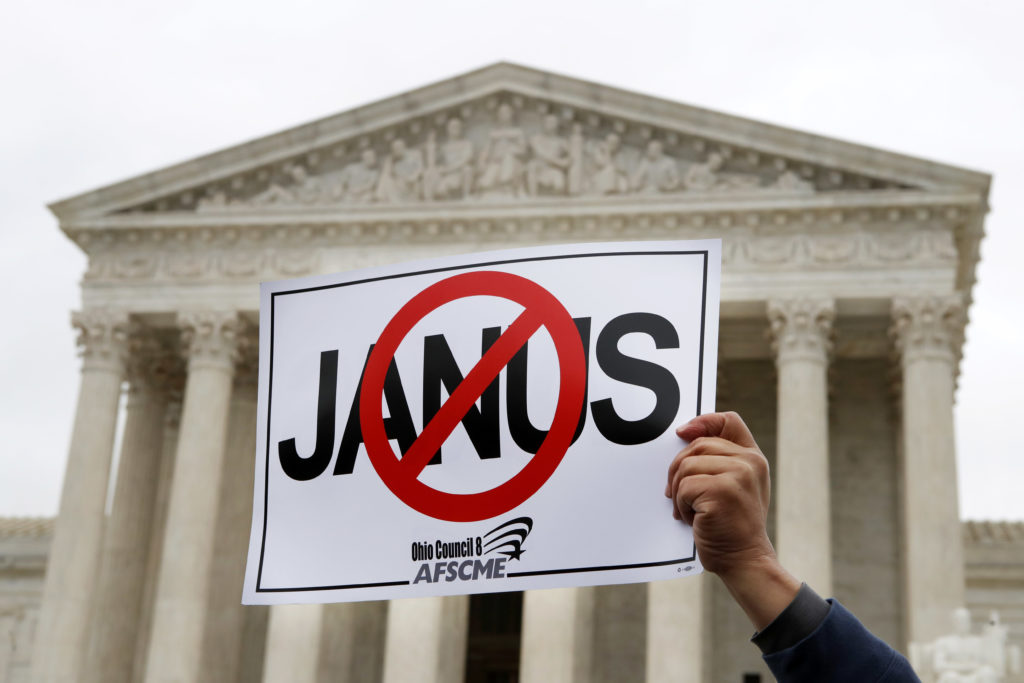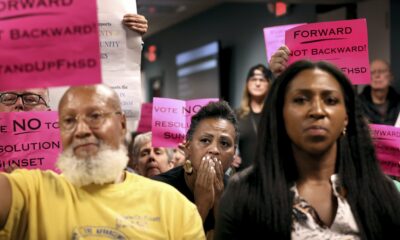Judging Janus
After ‘Janus’: Labor’s Recommitment Campaigns Energize the Rank and File
Co-published by The American Prospect
In the wake of the Janus ruling, well-funded right-to-work groups are preparing digital and door-to-door campaigns aimed at California’s public-sector workers.

For union organizers, the stakes are summed up by Flint, Michigan, the poster child for a city stripped of a robust public sector
and laid bare to privatizers.
Co-published by The American Prospect
The first email arrived a month before the U.S. Supreme Court’s June 27 Janus v. AFSCME decision, which struck a blow against the nation’s public-sector unions. On May 17, all 35,000 teachers in the Los Angeles Unified School District found personally addressed notes concerning their union, United Teachers Los Angeles, titled “UTLA’s new ‘irrevocable’ membership card.” The message had been sent on the district’s computer messaging system.
Sent by “Jami” on behalf of the stridently anti-union Freedom Foundation, the email ominously warned of the “fine print” on UTLA’s new, “Janus-proofed” membership authorization form. “Be aware of UTLA’s financial motivation before granting them the power to garnish your wages indefinitely,” it cautioned before inviting recipients to “pay less” by becoming an agency fee payer. (Agency fees are non-dues moneys collected from all employees to cover the costs of union operations, including contract negotiations, even if the employees don’t belong to union representing their interests.)
“[Janus] is lighting a fire under us, and it’s put us at a crossroads of sorts, where we understand that we have to do things differently.”
A second letter, sent by Amanda Burke of the Betsy DeVos-funded Mackinac Center for Public Policy, arrived in teachers’ inboxes on the very day of the Janus ruling.
“We don’t necessarily believe that just because there are a considerable number of individuals who have not opted out of their union necessarily means that that is their express desire,” explained Mackinac’s vice president of strategic outreach, Lindsay Killen, by phone. “So we want to make sure that we get them the information that they need.”
The emails are just part of the digital and door-to-door campaigns that anti-union groups have in store for California’s government workers. Yet unions have been preparing for Janus for several years and the response from organized labor might represent a paradigm shift that could transform public-sector organizing in the post-Janus world. California has already erupted in a virtual fever of union organizing and membership-building unseen since the public-sector labor movement’s formative heyday in the 1960s and ‘70s.
“It’s basically our new mode of operation,” UTLA’s Strategic Research and Analytics director Grace Regullano explained in a phone call to Capital & Main. “The plan is basically to talk with every single member in our union at some point every year about what the union means, and about recommitting to our union and our fight for public education. … It’s not just that you give us money and we go do the work for you, it’s that we are building power together.”
“This is motivating our union members and leaders to do things that they haven’t done before,” agreed the Los Angeles County Federation of Labor’s organizing director, Chloe Osmer. “[Janus] is lighting a fire under us, and it’s put us at a crossroads of sorts, where I think we understand that because of the attacks on our resources and our budgets, we have to do things differently.”
It’s also paying off. In 2016, 82 percent of UTLA members voted to raise their annual dues by about a third, to $1,000 a year. Though Regullano wouldn’t share specific numbers for UTLA’s ongoing “All In” membership campaign (“to deny the Mackinac Center and the Freedom Foundation a roadmap”), she estimated that organizers had successfully “cut in half” the number of fee-payers that had opted out of joining the union before the campaign.
That jibes with the net membership gains reported around the state by other organizing efforts. Though the campaigns are tailored to the memberships and political culture of each local, to some degree they are all modeled on membership conversations developed by home health care unions after the Supreme Court’s 2014 Harris v. Quinn decision declared unionized caregivers to be only “partial” public employees — and opened them to home visits from paid Freedom Foundation canvassers.
“The home care workers were kind of like the front line for this attack from the Freedom Foundation,” said Osmer. If public sector organizers have an ace in the hole, it may well be the public employees themselves. “The idea is not just, ‘Let’s go out and sign up people to join the union, but let’s identify and recruit new leaders within existing union members and really strengthen our network of member leadership. … How do we do it in a way that really builds long-term capacity and strength for the labor movement?”
The Mackinac Center and Freedom Foundation are betting that unionized workers, now “freed” by the Supreme Court will behave like neoliberal “rational actors” by defecting en masse from dues-paying to free-riding, thereby bleeding the unions. But the recommitment successes California organizers claim to have racked up suggests that the language of the marketplace might be an alien tongue for a workforce in public service.
“People who serve the public are mission-driven,” noted Debra Gabrelle, executive director of San Francisco’s International Federation of Professional and Technical Engineers (IFPTE) Local 21, the union that represents the city and county professionals and technical engineers. “They’re making sure that we’re all safe.” Local 21’s new “Gold Card” sign-up program invites members to recommit to the union by declaring their intention to remain in it and authorize dues deductions — despite the Janus decision. (Disclosure: The union is a financial supporter of this website.)
Local 21 member Anna Roche is a special projects manager for the San Francisco Public Utilities Commission, where she works on climate change-related issues, including the chronic erosion and sea level rise that are threatening San Francisco’s wastewater infrastructure at Ocean Beach. But she began her career in the private sector as an environmental biologist until a stint as a Peace Corps volunteer made it personally impossible for her to return.
“Dealing with clients that only cared about making money and didn’t really have any interest in protecting the environment just wasn’t very fulfilling for me,” she reflected. “I feel a greater sense of pride and fulfillment knowing that the work I’m doing is to keep San Francisco a place that people are proud of and . . . [that] we’re doing important work to protect the city against changes related to climate change.”
As a volunteer organizer for Local 21’s “Conversations and Cards” campaign, Roche is at the center of one of California labor’s most successful post-Janus recommitment drives. Modeled after the work of the United Domestic Workers of America health care workers, the campaign claims it has already increased her local’s dues-paying membership 11 percent from pre-Janus levels to today’s 91 percent.
“My experience is that people will pretty readily sign, because they’re already union members and they get it, Roche said. “I can understand that people have [problems] with unions, but you have to look at the overall good. The facts are that people that are represented by unions tend to do better in terms of salaries and benefits and treatment.”
If the immediate aim of Conversations and Cards is getting workers to sign Local 21’s new Janus-proofed union “Gold Card,” then the heart of the campaign, Gabrelle emphasized, is galvanizing the recommitment through the employee-to-employee conversation — connecting what’s at stake and the meaning of solidarity to produce a more active and long-lasting union member.
For IFPTE’s organizers, the stakes are summed up by Flint, Michigan, the poster child for a city stripped of a robust public sector and laid bare to privatizers. Flint’s lead contamination water disaster was notoriously abetted by Republican Governor Rick Snyder’s widely condemned emergency manager legislation, which itself was drafted with the help of the Mackinac Center. The irony that the same money from Mackinac’s billionaire funders (Betsy and Dick DeVos, the Walton family, the Koch brothers) is also behind both Janus and the California union-busting campaigns is not lost on IFPTE or Ken Jacobs, the chair of the University of California, Berkeley Center for Labor Research and Education.
“What people don’t realize is that as much we’re a labor town — there’s been a push to privatize here in San Francisco,” said Local 21 volunteer organizer Frances Hsieh, a senior policy analyst for San Francisco’s Office of Civic Engagement and Immigrant Affairs, who has personally signed up 35 Gold Card recommitments. “Unions have been fighting those corporate forces.”
“You go through a wide range of public services, where unions have been a central voice in stopping privatization, the central voice in assuring quality public services,” observed Jacobs. “Look at the Koch Brothers, who have been funding both the anti-union efforts with other billionaires and conservative foundations— their long-term goal had been to destroy public services and shrink government. So unions are an essential part of our democratic system, our democracy.”
Copyright Capital & Main
-

 California UncoveredApril 9, 2024
California UncoveredApril 9, 2024700,000 Undocumented Californians Recently Became Eligible for Medi-Cal. Many May Be Afraid to Sign Up.
-

 Feet to the FireApril 22, 2024
Feet to the FireApril 22, 2024Regional U.S. Banks Sharply Expand Lending to Oil and Gas Projects
-

 Class WarMarch 26, 2024
Class WarMarch 26, 2024‘They Don’t Want to Teach Black History’
-

 Latest NewsApril 10, 2024
Latest NewsApril 10, 2024The Transatlantic Battle to Stop Methane Gas Exports From South Texas
-

 Latest NewsApril 23, 2024
Latest NewsApril 23, 2024A Whole-Person Approach to Combating Homelessness
-

 Latest NewsMarch 27, 2024
Latest NewsMarch 27, 2024Street Artists Say Graffiti on Abandoned L.A. High-Rises Is Disruptive, Divisive Art
-

 State of InequalityApril 11, 2024
State of InequalityApril 11, 2024Dispelling the Stereotypes About California’s Low-Wage Workers
-

 Latest NewsApril 24, 2024
Latest NewsApril 24, 2024An Author Reflects on the Effort to Rebuild L.A. After the ‘Violent Spring’ of 1992




















